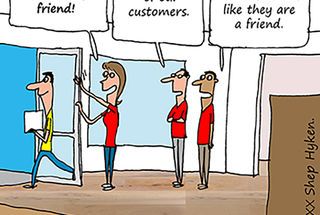Does It Matter How You Refer To Your Customers?

What do you call your customers? Do you call them "customers"? Maybe you call them clients, members, guests, patients, residents… the list can go on and on.
Some people say that the term "client" implies a long-term relationship. Isn't that what you want with all of your customers—a long-term relationship in which the customer continues to pay for what you sell? Of course!
Then there is the term "guest." I get that you may be a guest of a hotel or a restaurant. What about a guest at a car dealership or retail clothing store? Most people would call them customers. Actually, I like that businesses that would normally call a customer a "customer" promote them to the level of guest.
I have written about this before. The last article resulted from an Ace Hardware store referring to their customers as neighbors. When a customer walks through the door, an employee yells out, "Welcome, neighbor!" (Sounds a lot better than, "Welcome, customer!")
That brings me to a message I received from Antonia Sismani, one of our faithful subscribers. She wanted an opinion on why we call the experience a customer experience. In her mind, using the word "customer" puts distance between customers and the company. She feels it should be a people experience or a human being experience, and that if you really want to connect emotionally to the customer—which is one of the drivers of repeat business—then we must get closer to them. She asked, "Don't you think that if we rename the customer experience to the people experience that it would be enhanced and more mature? The goal is to have a more positive impact on everyone's minds."
I like the way you think, Antonia! In business, I've always believed that people do business with people. Even if they are doing business online, they are still interacting with a website that was designed by people to be used by people. I'm not sure that the word "customer" creates distance, but changing the word to something other than customer, such as people—or guest, client, member or even neighbor—could bring that customer emotionally closer. Changing the language isn't a big change, but in this case, it could emphasize the relationship that you and your organization are trying to achieve, which is that better connection with your customers—make that people—that makes them want to continue to do business with you.
Shep Hyken is a customer service expert, keynote speaker, and New York Times bestselling business author. For information, contact 314-692-2200 or www.hyken.com. For information on The Customer Focus™ customer service training programs, go to www.thecustomerfocus.com. Follow on Twitter: @Hyken
(Copyright © MMXX, Shep Hyken)